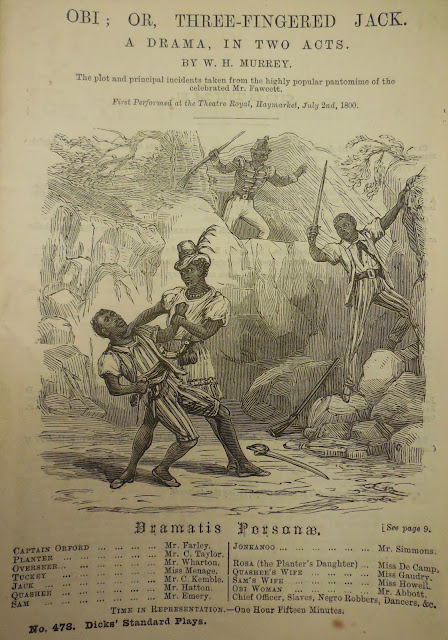W.H. Murray's drama of the Jamaican folk-hero Jack Mansong, Obi; or, Three-Fingered Jack, gained wide circulation when it was published in Dicks' Standard Plays.
According to the published text (which misspells Murray's name), the play's plot and incidents were "taken from the highly popular pantomime of the celebrated Mr. Fawcett." This was John Fawcett, whose earlier play about Jack Mansong premiered at the Haymarket Theatre in London on July 2, 1800.
It was Murray's version of the story that became widely known, and was re-enacted on countless toy theatre stages, so it's the one I want to examine right now. The first act begins with "A View of an extensive Plantation in Jamaica." We find out that it's the birthday of the plantation owner's daughter, Rosa. What is more, her sweetheart, Captain Orford, is coming to claim her hand in marriage.
While the day is happy, the plantation owner, Ormond, recalls a previous birthday of Rosa's when the young woman's mother fell beneath the hand of the infamous Three-Fingered Jack. The rebel escaped, and is now feared by whites and blacks alike, as he rampages the island in search of revenge. He is aided by his mother, a magician known as Obi Woman. She speaks in verse, giving her incantations an elevated air.
It is Jack's language that most eloquently calls out for revenge, though. In the third scene, he complains to his mother:
The gods of my fathers frown on my delay. Years have elapsed since I sacrificed the wife of the white man, a victim to the memory of my beloved Olinda, whom they tore lifeless from these arms as they dragged me from my native land; can I forget? can I forgive? Never.
Though Jack wanted to murder Ormond, his mother counseled a slower but sweeter revenge. With Ormond's daughter set to be wed, Jack attacks her beloved, Captain Orford, and drags his body back to his cave. Ormond promises freedom to the workers he has enslaved, and entreats them to wreck vengeance on Three-Fingered Jack.
In the second act, we learn that Rosa, refusing to believe that her beloved is dead, has fled in disguise and hopes to uncover the rebel's lair. She does in fact find the cave, but Jack captures her. Since she is dressed as a boy, he does not recognize her. Jack cannot allow a white person who has seen his hideout to return and disclose its location, so instead he enslaves his captive, echoing the actions of his enemy.
Just as Ormond has been calling out for vengeance, Jack is also seeking revenge, and he asserts, "it is not merely thirst of blood that fires me,--a nobler passion nerves my arm--vengeance!" Not trusting his captive, though, he blindfolds Rosa and leads her deeper into the cave, where she is brought together with another captive, her beloved Orford, who is in fact still alive, but is trapped behind a grated door.
When Rosa tries to free Orford, Jack binds her to a rock. The lovers make a second escape attempt, but again fail. However, the newly freed plantation laborers are able to track Rosa's footprints to the cave. They free Orford, but Jack runs off with Rosa. Two black men, Quashee and Sam, pursue him. By this point, Jack understands that the "boy" is the daughter of his sworn enemy. When she calls out for pity, Jack lambasts the hypocrisy of the plantation owners:
I had a daughter once; did they spare her harmless infancy? Where is my wife? was she spared to me? No! with blood and rapine the white man swept like a hurricane o'er our native village, and blasted every hope! Can aught efface the terrible remembrance from my soul, how at their lordly feet we begged for mercy and found it not.
In the end, the newly emancipated Quashee and Sam free Rosa and dispatch Five-Fingered Jack, but while the rebel is clearly the villain of the piece, he is also portrayed sympathetically and voices a clear anti-slavery viewpoint.
